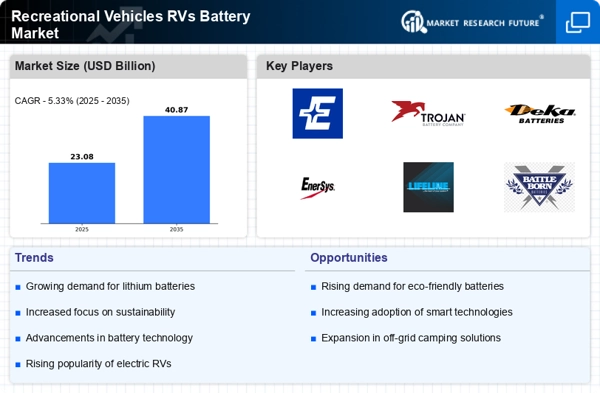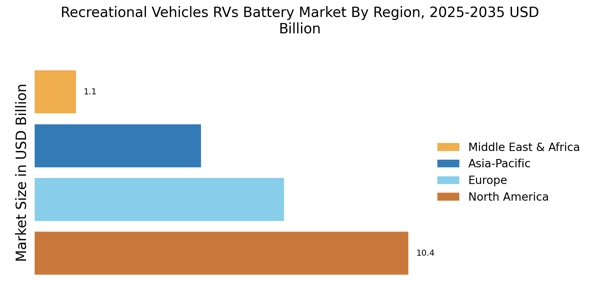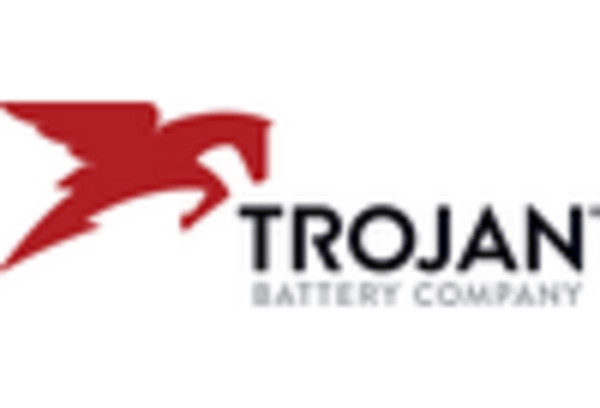Increase in RV Ownership
The rise in recreational vehicle ownership appears to be a primary driver for the Recreational Vehicles RVs Battery Market. As more individuals and families opt for RVs for leisure and travel, the demand for reliable and efficient batteries escalates. Recent data indicates that RV ownership has surged, with millions of new units sold annually. This trend suggests a growing market for batteries that can support extended travel and off-grid capabilities. Consequently, manufacturers are likely to focus on developing advanced battery technologies that cater to the specific needs of RV users, enhancing performance and longevity. The increasing popularity of RVs for road trips and outdoor adventures further fuels this demand, indicating a robust growth trajectory for the battery market in this sector.
Rising Interest in Eco-Friendly Travel
The growing trend towards eco-friendly travel is emerging as a significant driver for the Recreational Vehicles RVs Battery Market. As consumers become more environmentally conscious, there is an increasing demand for RVs equipped with sustainable energy solutions, including advanced battery systems. This shift is reflected in the rising popularity of electric and hybrid RV models, which require efficient and reliable batteries to operate effectively. Market analysis indicates that consumers are willing to invest in eco-friendly options, leading manufacturers to prioritize the development of batteries that minimize environmental impact. The emphasis on sustainability not only aligns with consumer preferences but also encourages innovation in battery technology, suggesting a dynamic future for the market as it adapts to these changing consumer values.
Growing Demand for Off-Grid Capabilities
The increasing interest in off-grid living and travel is driving demand within the Recreational Vehicles RVs Battery Market. As consumers seek to escape urban environments and embrace nature, the need for batteries that can support off-grid power systems becomes paramount. This trend is reflected in the rising sales of solar panels and energy storage systems designed for RVs, which often rely on advanced battery technologies. Market data indicates that a significant portion of RV owners now prioritize off-grid capabilities, leading to a surge in demand for batteries that can efficiently store and utilize renewable energy. This shift not only enhances the appeal of RVs but also aligns with broader sustainability goals, suggesting a promising future for battery manufacturers focusing on off-grid solutions.
Regulatory Support for Clean Energy Solutions
Regulatory frameworks promoting clean energy solutions are likely to bolster the Recreational Vehicles RVs Battery Market. Governments worldwide are increasingly implementing policies aimed at reducing carbon emissions and encouraging the adoption of renewable energy technologies. These regulations often include incentives for electric and hybrid RVs, which rely heavily on advanced battery systems. As a result, manufacturers may find themselves under pressure to innovate and produce batteries that comply with these regulations while meeting consumer expectations for performance and sustainability. The potential for government support and funding for clean energy initiatives could further stimulate market growth, as consumers become more inclined to invest in eco-friendly RV options. This regulatory environment appears to create a favorable landscape for the development and adoption of advanced battery technologies in the RV sector.
Technological Advancements in Battery Systems
Technological innovations in battery systems are significantly influencing the Recreational Vehicles RVs Battery Market. The advent of lithium-ion technology has transformed battery performance, offering higher energy density, lighter weight, and longer life cycles compared to traditional lead-acid batteries. This shift is evident as manufacturers increasingly adopt lithium-ion solutions to meet the evolving needs of RV users. Data suggests that lithium-ion batteries are projected to capture a substantial share of the market, driven by their efficiency and reduced maintenance requirements. Furthermore, advancements in battery management systems are enhancing safety and performance, making these batteries more appealing to consumers. As technology continues to evolve, the market is likely to witness further enhancements, potentially leading to even more efficient and sustainable battery solutions for recreational vehicles.


















Leave a Comment